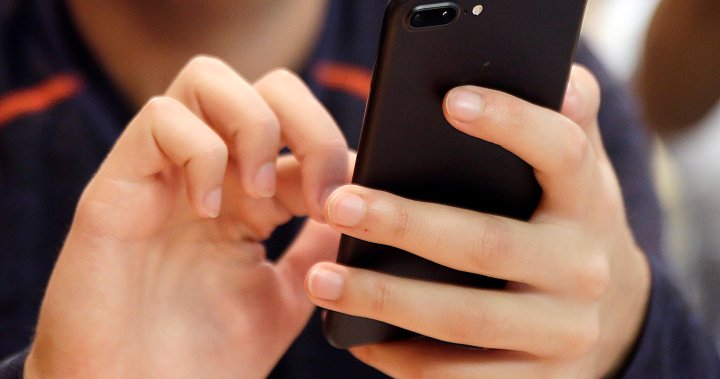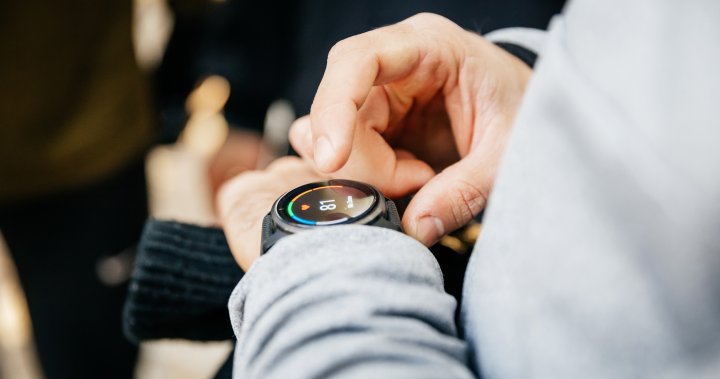The amount of time you spend online or on your phone can be linked to lower levels of mental health or dissatisfaction in friendships and relationships.
But new data from Statistics Canada finds there could be a possible sweet spot for how long you can use digital technology without too much impact — though some experts caution it’s all about regulation.
In a report put out by StatCan on Monday that highlights data from the 2020 and 2022 Canadian Internet Use Surveys (CIUS), the agency found of those who took a break from the internet in 2022, 44 per cent reported having very good or excellent mental health.
Yet while taking a break away from the internet can often be seen as a benefit, the report noted there may be even more benefit for those who keep their time online lower overall.
For example, Canadians who reported spending less than 10 hours weekly watching online content reported very good or excellent mental health at a rate of 16 percentage points higher than those who watched content for 20 or more hours per week.
Whether that 10-hour limit is a sweet spot, however, is what University of Alberta professor David Chorney said can depend on a variety of facts such as your line of work, relationship status or methods of communication.
“What’s too much? What’s too little? There can never be too little I don’t think,” he said in an interview with Global News.
“Try to honestly regulate yourself and know how much time you are in front of a screen and be honest with yourself is something I think we all have to do at the end of the day. We have to understand that spending too much time in front of a screen is not good for us.”
That message rings all too true to lawyer Brikena Rochette, who said during her articling period, which occurred during the COVID-19 pandemic, she would use technology more than she ever thought she would.
While articling at a criminal defence firm, she found Zoom being used much more for meetings with clients and in turn the use of not only her computer but her smartphone drastically increased.
Get the latest Health IQ news.
Sent to your email, every week.
“I was attached to my phone, it was my lifeline in every way,” she told Global News in an interview.
She said from calls with institutions, jails, her employer, and clients, as well as Zoom meetings, with COVID-19 it meant it was not easy to go out and disconnect. That meant workdays could expand both into evenings and even early mornings.
Eventually, Rochette said it started impacting not only herself but her family.
“My stepson at the time was only two and a half years old, and he got very, very used to just seeing me on the computer and he did not like it,” she said. “He would come and close my computer whenever he could … I started realizing that something had to change soon.”
In Rochette’s case, there was an end to the Zoom calls and meetings when her articling period ended and when she reached that point she said she started to find ways to disconnect.
That impact on relationships, however, is something StatCan found varied depending on how often people interacted with their smartphones.
According to the 2020 CIUS, Canadians who checked their smartphones once per hour or more were less likely to report being completely satisfied with their relationships with friends — about 44 per cent — than those who checked their phone a few times per day or less — about 54 per cent.
It noted the same pattern when looking at relationships with relatives or family members, excluding those they directly lived with.
The data did show some positives, however, to online communication with the 2022 CIUS finding that 77 per cent of Canadians communicated with friends online at least once per week and 65 per cent did the same with relatives or family members.
University of Toronto Mississauga postdoctoral fellow Dr. Jay Olson said this highlights a difference between active and passive use of technology.
“So active use is contacting people, chatting with them, planning meetups and that kind of thing,” he said. “The more passive use is scrolling through social media without necessarily posting something or commenting and sometimes this passive use can replace in-person socializing.”
That constant checking can often lead to lower levels of positive mental health, with about 58 per cent reporting very good or excellent levels who checked their phone just a few times per day or less, while just 50 per cent reported the same.
Among those who checked it hourly, almost 20 per cent reported just fair or even poor mental health.
Olson, who studies problematic cell phone use, said there has been consistent links between such use and mental health issues like depression, anxiety, loneliness and reductions in sleep quality.
“Some of these associations that we see with things like depression and anxiety exist because phones often interfere with other activities that might increase your well-being,” he told Global News, giving sleep and in-person socializing as examples.
“We think that because smartphones often interfere, or replace these activities, people just have less time for these activities that would normally boost their mental health.”
When it comes to what people can do to combat this, there is a variety of techniques people can use.
Olson said this can include reducing the number of notifications you may get and keeping technology like your phone outside the bedroom at night.
Chorney adds self-regulation is another tool, with people getting themselves to know how much time they’re in front of a screen and being honest with themselves about that number.
“So we have to learn how to regulate ourselves and going to bed without our brain being so stimulated by watching and seeing and hearing things on our devices,” he said.
For Rochette, she found ways to disconnect including signing up at her local gym and a dance studio. Now, when she is spending time with her family, her phone is not in use when her children are present.
“During my leisure time, I want to be able to really disconnect from my my phone and my computer,” she said. “My two cents is the best way is to just shut it off.”




